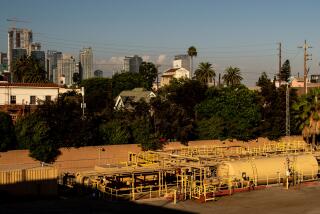A Quick Rebound Isn’t in the Cards for Big Oil Stocks
- Share via
Stocks of major oil companies are slumping badly, and nothing on the horizon suggests a fast rebound.
Investors have been dumping the oil stocks for much of this year, but the selling has intensified this month. The three major California firms--Chevron, Arco and Unocal--have led the latest slide.
Unocal, for example, has plunged from a 1991 high of $29.50 to $23.75, down 19%. The stock is near its two-year low of $22.875.
Chevron is at $69.50, down 13% from its 1991 high, and Arco is also off 13% from its high, to $117.50.
Some investors may be tempted to bottom-fish for the stocks here--especially considering that the oils look cheap next to most other stock groups. The typical major oil stock sells for about 12 times estimated 1991 earnings per share, versus 17 times earnings for the average stock in the Standard & Poor’s 500 index.
Unfortunately for the oils, that’s about the extent of the good news. Second-quar ter earnings probably will look awful overall, and the trend for the next six months isn’t encouraging. You’re going to need a strong stomach--and a very long-term time horizon--to hold these stocks now.
What’s gone wrong for Big Oil?
* Oil and natural gas prices are weak. Crude oil is having a tough time staying above $20 a barrel, as the world economy slows. And natural gas has been an outright disaster. The supply just keeps building, and demand isn’t keeping up. In New York, natural gas futures for July delivery fell another 1.7 cents Tuesday, to $1.245 per 1,000 cubic feet. Prices are at five-year lows, and the warm winter didn’t help things.
The natural gas supply “bubble” has been the bane of oil-and-gas bulls forever. They keep figuring that gas is the clean fuel of the future and that at some point the companies that have bet heavily on gas--such as Unocal--will be rewarded with better prices. But it isn’t happening.
* Pump wars have returned. Remember 90-cents-a-gallon gasoline not long ago? Unocal, Chevron and Arco ended up in a major price war at the gasoline pump this spring in California, all in the name of protecting market share in the recession. The same thing happened in the Northeast among Texaco, Sun and Mobil.
What’s disturbing is that the companies had long ago vowed to shareholders that they wouldn’t fall into the price-war trap again, notes Frank Knuettel, analyst at Prudential Securities in New York. But after gasoline demand dropped 3% in the first quarter, the oil companies panicked. The consumer won; shareholders lost.
* Clean-air laws are pinching. Analyst Curt Launer at Donaldson, Lufkin & Jenrette Securities recently downgraded his rating of Unocal to “neutral” from “moderately attractive” after the company detailed costs of meeting clean air laws at its refineries. Unocal had previously discussed spending $350 million to $400 million on refinery overhauls but now has added about $500 million just to recast its L.A. refinery, Launer said. So his $2-a-share earnings estimate for 1992 fell to $1.75.
* The stocks don’t “fit.” Investors are torn between two competing stock groups: Growth stocks, such as food and drug companies that show consistent earnings gains, and cyclical stocks, such as steel and auto companies that should see demand soar with an economic recovery. Oil stocks don’t fit in either group, so many investors are practically ignoring them.
Certainly, the oil companies should benefit if the global economy returns to health and energy use rises. But the overwhelming supply of crude oil and natural gas means that the oil companies won’t see earnings skyrocket no matter how strong the economic recovery. So investors are more interested in industrial companies--such as auto makers or steel producers--whose earnings could soar with even a slight pickup in demand.
One New York analyst admitted that he can make a case only for Unocal stock now for investors willing to look well into 1992 and beyond. Unocal earned $1.39 a share last year from operations (that is, excluding one-time gains and losses). This year, “even $1 may prove to be too optimistic,” this analyst said. Results for the current quarter may look good only because last year’s second-quarter operating earnings were so bad for Unocal.
Arco’s operating earnings, meanwhile, may be $8 a share or less this year, versus $11.38 a share from operations last year, when the buildup to the Persian Gulf War drove oil almost to $40 a barrel late last summer.
Even so, some analysts are trying to get clients to look on the bright side, however narrow that sliver of light seems to be. “The time to buy oil stocks is when the group is out of favor, as it is at present,” argues analyst Michael Young at Smith Barney, Harris Upham & Co.
He believes that big investors will jump back into the stocks again sometime in the next six months, on the usual seasonal bet that oil and natural gas prices will head higher with winter.
Knuettel, meanwhile, makes the case that the oil companies’ cash flows “are among the best in the market.” That’s nice, because it says the companies have plenty of cash coming through the door to pay the bills and maintain their dividends, even if reported earnings aren’t that great. To get cash flow, you basically take net income and add back those non-cash expenses (such as depreciation of plants and equipment) that reduce a company’s reported earnings but in fact don’t use up real money.
Arco’s cash flow probably will be $22.50 a share this year, Knuettel estimates, even though actual earnings per share will come in at $9.05, by his calculations.
Still, cash flow doesn’t sell stocks these days. Investors get excited when they see real earnings rising, and there isn’t much chance of that for most oil companies this year, barring another engineered world disaster, a la Kuwait.
The only reason to buy--or stay in--the oil stocks is if you’re willing to make a long-term bet on global economic growth and steadily rising energy prices. For the time you may have to wait, you’ll earn decent dividend yields on most of the major oils. Unocal’s yield is just 2.9% at the stock’s current price, but Arco and Chevron yield 4.7%, and Mobil yields 5%. That means you can earn almost as much from the dividends as the typical money market mutual fund, which now pays 5.5%.
Just remember that the wait for a payoff on the stocks could be long indeed. Anyone other than conservative, patient investors need not apply.
Oil Patch Blues
Earnings of most major oil companies are expected to be down sharply or flat in the second quarter, and their stocks have fallen in anticipation.
2nd qtr. Est. 52-week Tues. Stock est. EPS chng. high/low close Amoco $0.87 +16% $60 3/8-$47 $51 3/4 Arco 2.10 -10% 142 1/4-113 1/4 117 1/2 Chevron 1.29 -21% 81 5/8-66 1/2 69 1/2 Exxon 1.00 +15% 61 3/8-46 3/4 57 Mobil 1.17 -2% 69 3/4-55 1/8 64 3/8 Occidental 0.20 -15% 27 1/4-16 1/2 22 Phillips 0.48 +2% 31 1/8-23 7/8 26 1/8 Unocal 0.28 +100% 34 1/2-22 7/8 23 3/4
Source: Analysts’ consensus earnings per share (EPS) estimates, from Zacks Investment Research
More to Read
Inside the business of entertainment
The Wide Shot brings you news, analysis and insights on everything from streaming wars to production — and what it all means for the future.
You may occasionally receive promotional content from the Los Angeles Times.










